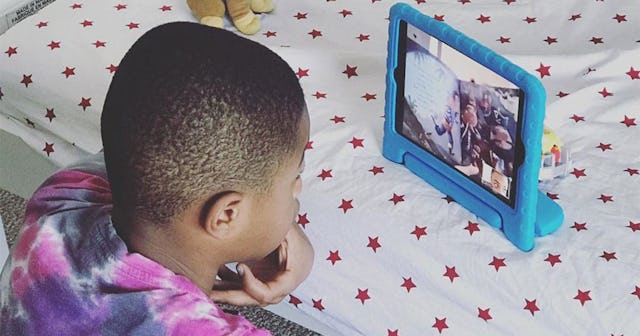What 'Stuck At Home' Life Has Taught Me About My Child With ADHD

Quarantine is no walk in the park for any child and parent. However, when a kiddo has special needs, such as ADHD, quarantine can be particularly challenging. Pair this with helping multiple kids e-learn while you try to keep your job and stay on top of household tasks, and it’s a formula for disaster. Or so I (wrongly) assumed.
I’ve been pleasantly surprised how well my child with ADHD has adapted to quarantine life, including distance learning. I was, like all parents, initially overwhelmed. On top of helping all of my kids e-learn, I was trying to figure out how my child’s IEP, their individual education plan, would manifest at home. How would we carry out therapy, accommodations, modifications, and special education instruction while not being physically in the school building? Gulp.
According to ADDitude, attention deficit hyperactivity disorder is “a complex brain disorder that impacts approximately 11% of children.” It is a “developmental impairment of the brain’s executive functions” that make impulse-control, focusing, and organization difficult. ADHD is not a behavioral disorder, mental illness, or specific learning disability.
During the first few weeks of quarantine, I went into overdrive, frantically e-mailing my child’s teachers and therapists. I called our educational advocate, trying to brainstorm ideas and be proactive. Many of my friends are in education, so I also roped them in. This type-A, anxious mama wasn’t playing.
It turns out, social isolation as a family has been an overwhelmingly positive experience for my child with ADHD. Part of this is because my child has amazing educators who are supportive and encouraging. The other reason? I didn’t realize my own child’s potential to navigate this new path. Time was my teacher.
My child can adapt in time.
The minute I realized that our kids were going to be out of school, I felt panic set in. Many kids with special needs thrive on routine and structure—AKA, predictability. I quickly created a schedule for my children, which we have altered and continue to use now. However, I had prepared myself for some epic meltdowns, common in kids with ADHD when things in their lives go awry. Despite all of the drastic changes, including distance-learning and being home 24/7, my child has adapted well, even better than some of my kids who don’t have ADHD.
My child is practicing problem-solving skills.
Our big family means there’s a lot of sibling bickering. I’m going to call this an “opportunity” to practice problem-solving skills. There’s certainly no lack of socialization in our home, but with this comes a lot of arguments over everything from toys, to personal space, to breathing and eye contact. All of my kids have been working on important skills like compromise, apologizing, kindness, and what to do when things don’t go their way. Kids with ADHD tend to perseverate (AKA: get stuck) on certain moods, desires, or behaviors. Our family interactions are giving them the chance to practice navigating this in a real-life setting, every day.
My child is capable of more than I thought.
Normally, I’m a bit of a kitchen control freak. The kids sit at the bar, and I hand them lunches, refill their waters, or whatever else they need to avoid kitchen traffic. However, I was so tired and overwhelmed, that I told the kids to make their own lunches. There were two stipulations. Their lunch had to be healthy, and they had to clean up. Every one of my kids, including my preschooler and my child with ADHD, met both expectations with ease: making a peanut butter and jelly sandwich, adding a few veggie straws, and then getting some raw fruits and veggies. I admit, I was shocked but pleasantly surprised. Oftentimes, a child with ADHD can have a hard time with executive functioning — that is, carrying out a task from start to finish.
My child is learning to self-advocate.
On a particularly hectic morning, we had three Zoom calls scheduled at the exact same time. After I got two of my kids settled, I joined my child with ADHD for their meeting. Fifteen minutes in, with over half of it glitchy and difficult to hear, my child looked at me and said matter-of-factly, “I’m done.” Who could blame them? Sustaining attention in the classroom, with peers and teachers physically present, is challenging enough for a child with ADHD, let alone via video and at home during a global pandemic. I felt slightly defeated, but my child was clearly communicating their needs. We exited the meeting, and my child dashed off to play. After a few times of this occurring, I decided to no longer have my child participate in these meetings. It wasn’t a learning experience, that’s for sure.
My child is happy.
I used to believe that the structure that five-days-a-week school provided was the ticket to my child’s stability. Now that we’re sheltering in place, my kids are getting more “recess” than ever before, most of it outdoors. All of the gross motor and imaginative play is so healthy and helpful. A child with ADHD often develops preferences that they might hyperfocus on. Some tend to do this with video games. For us, my kiddo can hyperfocus on a gross motor activity like riding their bike, playing four-square, or engaging in a dress up with siblings. The more energy expended throughout the day, the happier my child is.
None of us were prepared for the global pandemic, making the balancing act challenging and at times, unpredictable. However, I’m beginning to learn to take the wait-and-see approach rather than prepare-for-the-worst-hope-for-the-best when it comes to guiding my child with ADHD through these long days and weeks.
This article was originally published on